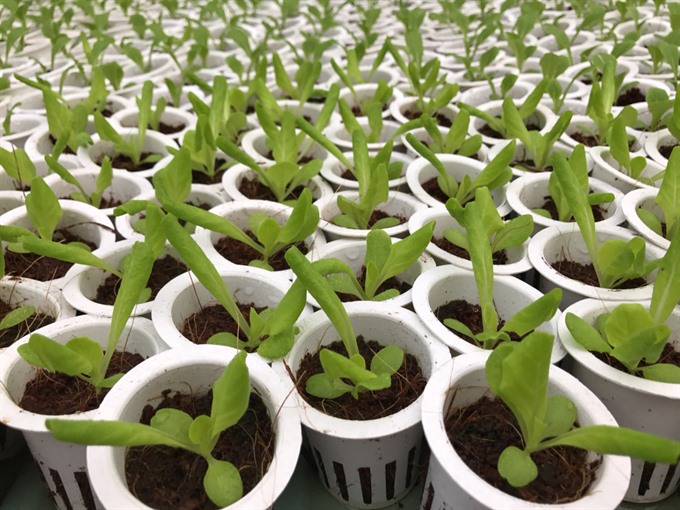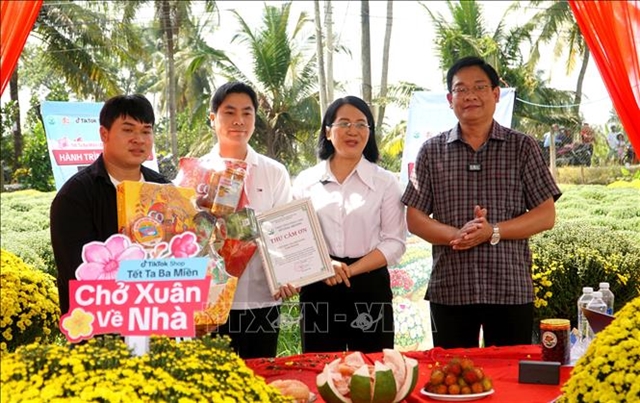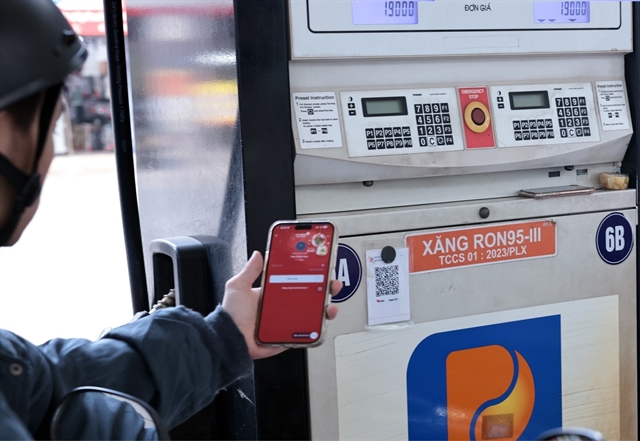

The world of information technology has come into farming in the central region. Nguyễn Quốc Phong has brought those skills with him to farm in a way that soil is not used to grow crops.
 |
| Hydroponics farming helps farmers in flood-affected areas in central Viet Nam maintain their production in the rainy and flood season. — VNS Photo Thanh Sương |
The world of information technology has come into farming in the central region.
Nguyễn Quốc Phong has brought those skills with him to farm in a way that soil is not used to grow crops.
Rather, crops are fed water with special food for plants in the liquid.
Farmers can use their smart phones to tell them when it is time to water their plants that are grown in this way.
By Hoài Nam
After working with the military-run telecom group Viettel for seven years, Nguyễn Quốc Phong decided he wanted to do something else.
The 33-year-old man from Núi Thành District in Quảng Nam Province has since used his IT know-how and experience to study and promote hydroponic farming, launching a startup of his own.
Hydroponics is a subset of hydroculture, the method of growing plants without soil, using mineral nutrient solutions in a water solvent. Terrestrial plants may be grown with only their roots exposed to the mineral solution, or the roots may be supported by an inert medium, such as perlite or gravel. (Wikipedia)
Phong surfed the internet for information and solutions, found suppliers in the Netherlands and Israel, imported materials and quality fertilizers and seeds.
“It’s not new in the world, but it has just emerged in central region. Farmers have a long tradition of growing vegetables in the soil, which is low cost and easy, but also carries the risk of contamination with water and air pollution already at alarming levels. And with rapid urbanisation in the region, it is not going to get better soon.
“Local farmers still hesitate to change to new agriculture, or hi-tech farming. They are used to growing with easy tools, but not electronically controlled devices or smart-phone guided production,” Phong said, explaining why his company, H2O Farm Viet Nam, has launched a package solution.
Phong said the package, including recycled water mixed with fertiliser, a pumping system and pipes made with durable material, would help farmers save a lot of time working with soil, manual watering and dealing with pest problems.
“Farmers can manage operation of the system with their smartphones to set up nutrition pumping timer for the vegetables, and they do not need to work directly with hazardous pesticides.
“However, they have to change from their labour-intensive farming into hi-tech application production with stricter conditions like using toxin-free water and specific doses of other inputs like fertiliser and sunlight,” he said.
Phong explained that water at all the farms has to be tested to eliminate hazardous contaminants, while seeds and fertilisers from the Netherlands and Israel would offer suitable material for hydroponic farms.
He said 24-hour programmed pumping system will help carry a mixture of water and nutrition to grow saplings.
“It’s like a stream running day and night. Roots will absorb nutrition from the water running through pipes. Each sapling grows in a plastic box, and farmers can harvest easily by moving it up after 25 days,” he said, adding that a small household’s hydroponic garden could produce 40kg of greens each month.
Household gardening
Trần Thị Anh Thư, a Đà Nẵng resident, said she installed a 6sq.m hydroponic garden on her rooftop eight months ago, growing vegetables for her family.
“I could harvest vegetables from this garden 25 days after sowing. I do not have to buy these vegetables from the market anymore, because the garden provides plenty and we even have some for neighbours,” Thư said.
Her family needs at least 3kg of fresh vegetables a day.
“I invested VNĐ10 million (US$442) for installation of the hydroponic system including water pipes, beds, pumps and seeds. I just spend a little money (around $5) for buying new seeds or fertilisers a month.”
Thư said she did not spend a lot of time on the garden, and had more time now for housework and caring for children.
The 42-year housewife also said she had planted vegetables in soil on plastic trays or styrofoam boxes, but that required more time to water, protecting the plants from pests and rats.
She said the hi-tech garden was really suitable for household that wants safe vegetables.
Bùi Thị Thanh Sương of Điện Bàn District in Quảng Nam Province, said her family had grown vegetables for 20 years via traditional farming, and only recently began hydroponic farming as a trial.
“In co-operation with the H2 Farm Việt Nam company, we have developed a small hydroponics area on our 3,000sq.m garden with total investment of VNĐ70 million ($3,000),” Sương said.
“We saw that growers did not waste time to clear weeds, prepare soil or halt crops because of rain or floods.”
The 26-year-old woman said that in hydroponics, pest and insect attacks could be avoided, and strictly tested quality seeds would ensure a bumper crop. "While it requires more investment than traditional farming, the focus is on consumers seeking high-quality produce," she said.
“High and medium income customers have gradually been seeking safe food and vegetables. They are willing to pay higher prices for daily greens at selected places,” she said.
She said hydroponic salad greens, including lettuce costs between VNĐ60,000 ($2.6) and VNĐ90,000 ($3.9) per kilo, much higher than normally grown vegetables, which only cost between VNĐ10,000 ($0.44) and VNĐ40,000 ($1.7) per kilo.
Sương said her family supplies 70kg of vegetables every day to farms with the Việt Nam Agriculture Practice (VietGAP) certification.
However, hydroponics is still limited to growing leafy vegetables, and it should be expanded to other products like beans, pumpkins, potatoes and tomatoes, Sương said.
Minimum cost
Phong said his company can design a household hydroponic garden of just 2 to 6sq.m at minimum costs of VNĐ6 million ($265) to VNĐ8 million ($354).
He reiterated that hydroponics can help prevent the alarming overuse of stimulants in agriculture.
He said he plans to expand hydroponics into mountainous areas in Quảng Nam, where farms are destroyed by disasters every year, and promote household gardening in Đà Nẵng and Tam Kỳ cities.
“Household hi-tech gardening can supply safe greens to supermarkets or directly to urban communities, and its expansion would also reduce investment.” — VNS
GLOSSARY
The 33-year-old man from Núi Thành District in Quảng Nam Province has since used his IT know-how and experience to study and promote hydroponic farming, launching a startup of his own.
Know-how means knowledge.
Hydroponics is a type of farming that involves growing plants without soil, using only water that contains food for the plants.
Phong surfed the internet for information and solutions, found suppliers in the Netherlands and Israel, imported materials and quality fertilizers and seeds.
Solutions are answers to problems.
Things that are imported are bought from other countries.
“Farmers have a long tradition of growing vegetables in the soil, which is low cost and easy, but also carries the risk of contamination with water and air pollution already at alarming levels.”
Contamination happens when a substance, like water, becomes dirty or polluted.
And with rapid urbanisation in the region, it is not going to get better soon.
Urbanisation is the process that sees people moving from country areas to the big towns and cities. Rapid urbanisation takes place when this happens very quickly.
Phong said the package, including recycled water mixed with fertiliser, a pumping system and pipes made with durable material, would help farmers save a lot of time working with soil, manual watering and dealing with pest problems.
Durable means tough and long lasting.
Pests are little creatures that are a nuisance.
“Farmers can manage operation of the system with their smartphones to set up nutrition pumping timer for the vegetables, and they do not need to work directly with hazardous pesticides.
A pumping timer is a clock that is attached to a water system that gets the pumping of water to happen at certain times.
Nutrition means food. In this case it is food for the plants that is mixed with water.
Hazardous means dangerous.
Pesticides are chemicals that are used to get rid of pests.
“However, they have to change from their labour-intensive farming into hi-tech application production with stricter conditions like using toxin-free water and specific doses of other inputs like fertiliser and sunlight,” he said.
In labour intensive farming there are many people employed to do farm work.
Toxin means poison.
Specific doses means carefully worked out amounts.
Phong explained that water at all the farms has to be tested to eliminate hazardous contaminants, while seeds and fertilisers from the Netherlands and Israel would offer suitable material for hydroponic farms.
To eliminate something means to get rid of it.
Contaminants are things that cause contamination.
He said 24-hour programmed pumping system would help carry a mixture of water and nutrition to grow saplings.
Saplings are young trees.
“Roots will absorb nutrition from the water running through pipes.”
Absorb means “take in”.
“I could harvest vegetables from this garden 25 days after sowing.”
Sowing means planting by scattering seeds around.
“I invested VNĐ10 million (US$442) for installation of the hydroponic system including water pipes, beds, pumps and seeds.”
If you have invested in something, you have put money into it in the hope of making more money from it.
However, hydroponics is still limited to growing leafy vegetables, and it should be expanded to other products like beans, pumpkins, potatoes and tomatoes, Sương said.
Expanded means spread.
He reiterated that hydroponics can help prevent the alarming overuse of stimulants in agriculture.
Stimulants are things that cause quicker growth, or movement, in a plant or animal.
WORKSHEET
State whether the following sentences are true, or false:
© Duncan Guy/Learn the News/ Viet Nam News 2018
1. True; 2. False; 3. True; 4. False; 5. True.




